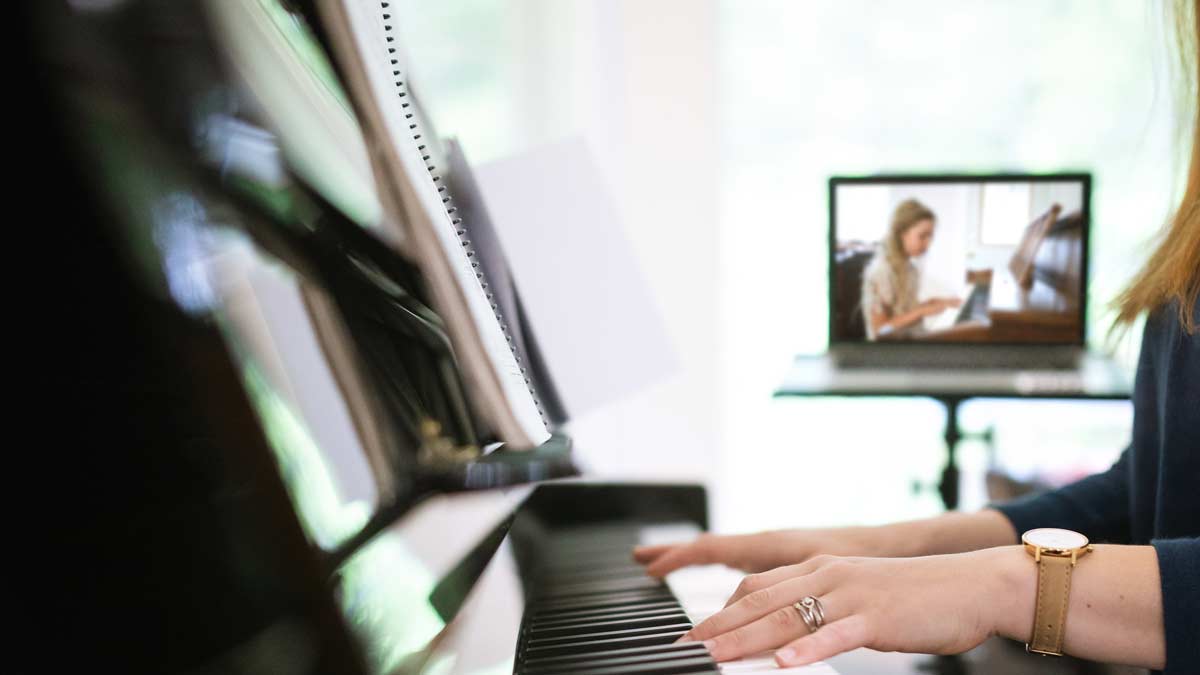
I am starting to see the light at the end of the tunnel! I am fully vaccinated and so are all my students’ parents. Some of my students’ parents are asking if they can resume in-person piano lessons in my home.
They may have been frustrated by having their child’s piano lesson on ZOOM, but something positive did happen: my students made very good progress!
How is that possible you ask? Here is my answer: I required that the parents be present at the entire lesson every time. The parents began to see what I required as far as preparation, and also began to understand the goals I had for their child along with subsequent benefits of piano lessons.
On one occasion, one of my 7- year- old students was trying unsuccessfully to fix the camera herself and also had a meltdown during the lesson. I couldn’t understand what was going on until I asked her where her mother was. She told me that her mother had to do some extra work and was upstairs in her office. Her father was home, but for some reason, he couldn’t be present at her lesson. They had just sent the child to the piano by herself.
No, no, no, I thought. Immediately after the lesson, the mother got an email from me. I explained what had happened during the lesson and offered to reschedule any time she could be present. I explained that piano lessons are not like online school and I really needed her there.
Today’s blog is about the need for parents to help their child who is taking piano lessons.
One of my beginners is a very bright 7 year old boy who is finishing 1st grade. For the studio recital 2 weeks ago, he was given a 5 finger scale that was in a very cute pattern, not difficult to understand, but it did need to be repeated daily. He had this little exercise for a month in addition to his piece that he performed. I had wanted him to do a duet with his mother, but he had a tantrum at the lesson before the recital, accusing everyone of criticizing him, so I told him that it wasn’t necessary for him to play the duet. He got very quiet and looked at me with disbelief, but I said again he didn’t have to perform the duet. I could see in his face that he had changed his mind and wanted to play it, but he wouldn’t back down from his original pronouncement.
At the recital, I could hear her telling her son where to put his hands on the keyboard and which note he should start on. I also heard her singing the tune of the 5 note exercise so he would know where he was. I was concerned because this indicated he did not understand why I had asked him to do this.
After the recital, I got a nice email from his mother thanking me for everything and saying that she and her son would play a duet next time.
This is my reply: (in place of his name, I have written “your son”)
“This is what I’d like to see happen with (your son):
I would like him to practice with you 10 or 15 minutes every day. He cannot do it on his own. He must be able to remember where the starting notes are and which hand and which finger. But he can only do that if he has the repetition as a foundation.
(Your son) is so intelligent and bright and quick, but piano is a different ballgame than school stuff. We think nothing of taking our kids to soccer or swim practice several days a week because we know that only through physical practice can a skill get better. Piano is both physical and intellectual. It involves many muscles in our fingers and hands and arms. And then we have to know where the notes are and count correctly at the same time. So it’s these 3 things that must be always done at once (hand position, correct notes, correct rhythm) and that’s an awful lot to ask of a child, but they do it with lots of repetition and then it becomes second nature.
I think that because he isn’t secure with his understanding that only daily repetition can bring, he gets frustrated and embarrassed easily.
For example, being able to play with his fingers connecting to each other (i.e., legato) was doable for him when I came over because I had him do it several times. But that kind of thing has to be repeated constantly because it is physical. When he is assigned a (5 finger scale/exercise), for example, in one week he should be able to understand where to put his fingers and how many times he plays it up and down before he plays the last time. And understanding rhythm, not just saying 1,2,3,4 after he plays a whole note, but realizing that as soon as he plays the note, that it is “1”.
I know you’re busy. You work hard and then come home and have to work again. And there is homework, and after school friends, and other stuff. The only way this works is if it is scheduled and the same time every day, hopefully not too late when everyone is tired.
If he feels he doesn’t really understand what’s going on, doesn’t make progress, his confusion will become a constant frustration, and then he will beg to quit.
If he begins to see progress and gets to play more difficult pieces, he will be very proud of himself and want to show that off.
I strongly encourage all of my parents that they work with their child at each practice time through the 5th grade, some through the 6th grade. And then, you and he will see the progress and it won’t be a chore after a while, but will become a truly special bond: He’ll have appreciation for music in his life forever.”
Until next time,
Laura

